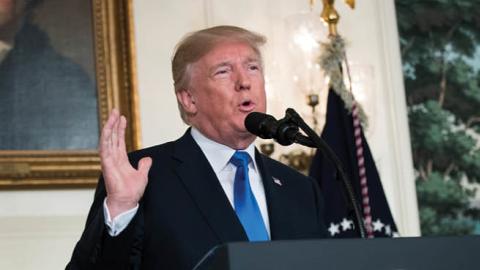Voting has begun, unfortunately, before a serious discussion of foreign policy. It is rather odd since President Trump, never one to conceal his victories from view, has a powerful story to tell.
He might begin by reminding voters of his ability to make tough decisions. He ordered the execution of ISIS leader Abu Bakr al Baghdadi and Gen. Qassem Soleimani, the latter prompting the following statement from Democratic presidential nominee Joe Biden: “President Trump just tossed a stick of dynamite into a tinderbox. We could be on the brink of a conflict across the Middle East.” This hunt for reasons not to act was consistent with reports from Obama administration officials that Biden advised against the killing of Osama bin Laden until more information was available — information that turned out to be unnecessary.
Biden’s fears proved unfounded. Instead of initiating a full-blown conflict, the Iranians dialed back on violence, naming an administrator to replace the terrorist. Soleimani was succeeded by Brig. Gen. Esmail Ghaani, an administrator whose “war-era record does not display the same degree of distinction as Soleimani’s,” according to Ali Alfoneh, a senior fellow at the Arab Gulf States Institute in Washington. The explosion Biden predicted has not occurred, although this being the Middle East, best to add the words “so far.”
Biden’s foreign policy record is best summarized by Robert Gates, who served as Defense secretary to both hawkish former President George W. Bush and more dovish, or cautious if you prefer, former President Barack Obama. Gates said Biden “is impossible not to like … a man of integrity. Still, I think he’s been wrong on nearly every foreign policy and national security issue for the past four decades.” Enough said.
Trump’s most recent victory, brokering an economic normalization deal between Serbia and Kosovo, included an agreement by Kosovo to normalize ties and establish diplomatic relations with Israel. As part of the deal, Serbia agreed to open a commercial office in Jerusalem and move its embassy to that city. This was frosting on the cake of the earlier deal the Trump administration engineered between Israel and the United Arab Emirates. At a stroke, the deal removed the Palestinians’ ability to veto any progress by demanding that their unreasonable claims must come first. Progress will now proceed while the Palestinians and their Iranian allies can do no more than complain and explode the occasional bomb. Note that Saudi Arabia, still officially insistent on Palestinian rights and, along with the British foreign office, on a two-state solution, granted use of its air space for the historic flight from Israel to Dubai.
But there is more, much more. American presidents have spent decades complaining about Germany’s refusal to devote 2% of its gross domestic product to NATO. Trump said enough is enough. If Germany doesn’t want to spend on what presumably is its own defense and has announced that it has no plans to honor the 2% pledge while pouring billions into Russian President Vladimir Putin’s coffers to purchase Russian natural gas, Germany must not see Russia as a threat to its interests. So German Chancellor Angela Merkel cannot be worried about Trump’s decision to withdraw 12,000 troops from Germany and transfer about half of them to other European countries. Some 6,400 will return to the United States.
Then, there is China. Again, American presidents occasionally tapped the communist leadership on its collective wrists when its trade practices violated the promises it made in return for the advantages of membership in the World Trade Organization. The Communist regime openly stole American intellectual property worth billions, required American firms seeking access to the Chinese market to turn over their intellectual property, and subsidized state-owned enterprises that decimated the U.S. manufacturing sector and the communities in which its factories were located. Meanwhile, the coastal elites insisted that economist Adam Smith was wrong when he recommended retaliation against any nation behaving in that way and taking account of security interests when devising trade policy.
It took Trump to say that enough is enough, impose tariffs on China’s exports, crack down on China’s spying and propaganda efforts that are corrupting American academics, deny China access to data and information no adversary should have, and begin to reduce American reliance on China for medicines and key resources. In short, Trump is unwinding a relationship with China that was the darling of America’s globalists.
Finally, consider policy toward Russia, a country whose leader Trump is accused of admiring, which is probably true since Trump seems to have a soft spot for any thuggish leader who strides across the world stage. When Obama denied Ukraine the lethal weapons it needed to fend off Putin’s invasion, Trump sent those weapons, including Javelin anti-tank missiles. That he later got himself impeached by seeming to hold those weapons hostage to obtain a Ukrainian investigation of Biden’s son is one of those self-inflicted wounds in which Trump specializes, seemingly understanding neither its immorality nor its consequences. Add crippling sanctions against leading Russian oligarchs and you have a policy that seems to run counter to Trump’s apparent affection for Putin, although his passivity in the face of recent Russian provocations from Syria to Alaska is a reaction from a usually bellicose president that is difficult to understand.
Little of this will be in most voters’ minds as one of the several factors to consider as we try to choose between bad and worse. Pity.
Read in the Washington Examiner



















